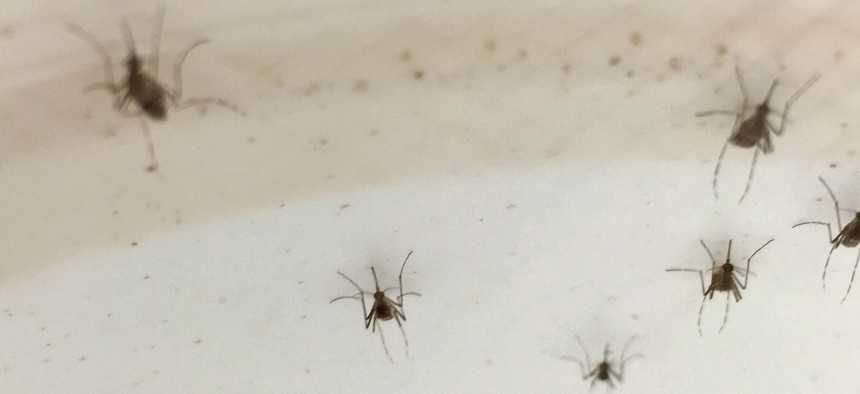
NIAID
Hillary Clinton to Congress: Come Back to D.C. and Fund Zika Research
The Democratic presidential nominee urged legislators to cut their recess short and come together during brief remarks in Miami.
Hillary Clinton has a message for congressional Republicans: Get back to work.
At a Florida campaign stop on Tuesday, the Democratic presidential nominee urged members to return to Washington and pass additional funding for Zika, which public-health officials confirmed last month has spread locally in the Miami area.
“I am very disappointed that the Congress went on recess before actually agreeing on what they would do to put the resources into this fight, and I really am hoping that they will pay attention. In fact, I would very much urge the leadership of Congress to call people back for a special session and get a bill passed,” Clinton said. “Get a bill that is focused on combatting Zika passed. Then health departments, local and state governments—everybody will know that there are resources coming forth and they will be able to take action.”
Clinton spoke from Miami’s Borinquen Medical Center, which she toured with Carlos Gimenez, the Republican mayor of Miami-Dade County. The center is close to ground zero for local transmission of Zika in the United States, the city’s Wynwood neighborhood. Just before she began speaking, the number of total locally acquired cases ticked up to 21: Florida Governor Rick Scott announced four more cases of Zika in Wynwood.
Clinton’s message Tuesday was more of a position statement than sincere call for action. She knows as well as anyone that congressional Republicans won’t heed her advice: They certainly haven’t listened to other calls for a shortened recess from their Democratic counterparts or Republican Senator Marco Rubio, one of the only GOP members to push for more robust funding. But her appearance on Tuesday in swing-state Florida may help Democrats frame Zika as a campaign issue, and presents Democrats as the party more willing to get funding passed.
Congressional Democrats have publicly chastised Republicans on Zika as the available funding for agencies steadily shrinks; they accuse GOP members of turning a public-health issue into a political one. Sylvia Mathews Burwell, the secretary of health and human services, recently predicted that current funds, repurposed from existing coffers by the Obama administration in the spring, will dry up by the end of September. Republican members of Congress criticized the administration for asking for additional money while officials were, in their estimation, not spending the existing funds quickly enough.
Efforts to pass additional Zika money hit a wall in the days before Congress left town in mid-July. Senate Democrats twice blocked a $1.1 billion funding package negotiated in conference meetings between congressional Republicans; they oppose provisions that would restrict money from going to Planned Parenthood affiliates, loosen pesticide regulations, and glean funds from Obamacare. A spokesman for Senate Majority Leader Mitch McConnell said recently that Democrats could “end their filibuster” on the funding package “and simply give unanimous consent to pass the conference report and send it straight to the president this week.”
Clinton, who earlier this year endorsed the Obama administration’s original $1.9 billion funding request for Zika, doesn’t support the Republican deal. On Tuesday, she pushed for a separate, bipartisan $1.1 billion funding package that passed the Senate back in May.
The first cases of local transmission in the country were confirmed in late July, when Congress was already in recess. This week, public-health officials began investigating possible local transmission in Palm Beach County, Florida, and a child with Zika-related birth defects died in Texas. On Tuesday, Clinton argued that additional funding now would prevent future cases. “This is always a problem on the brink of a public-health challenge,” Clinton said. “If it hasn’t happened to you, if it hasn’t happened to somebody you know, it’s hard sometimes to get people mobilized. But this is an epidemic that will only grow and affect more people.”







